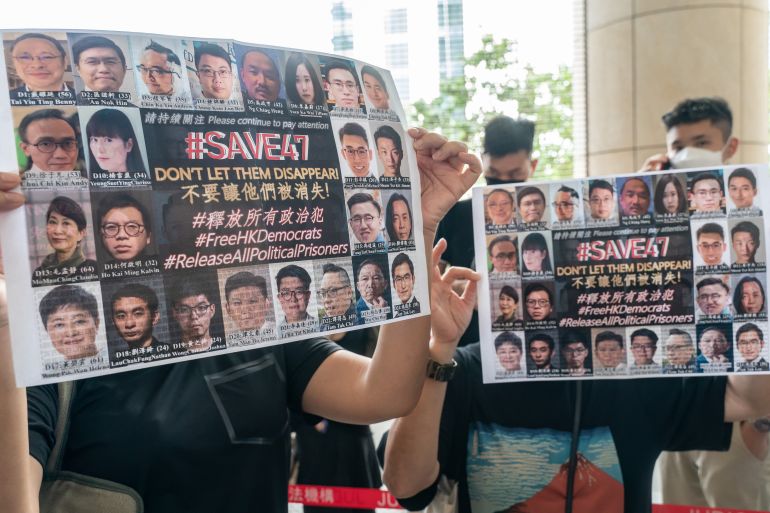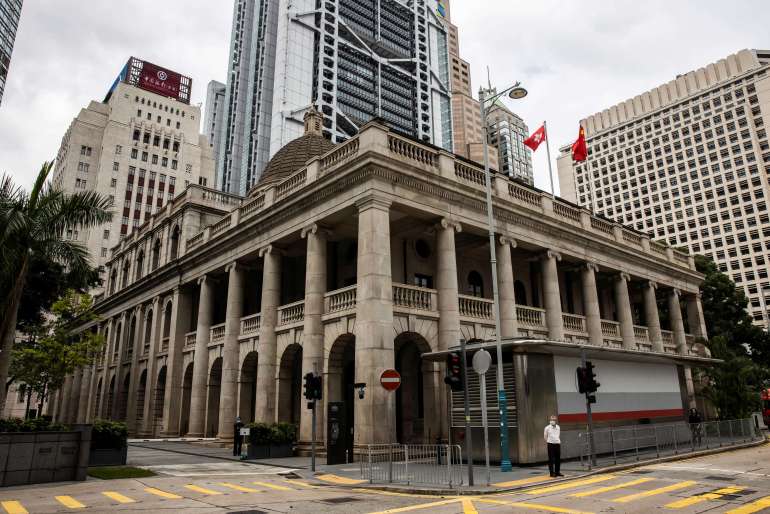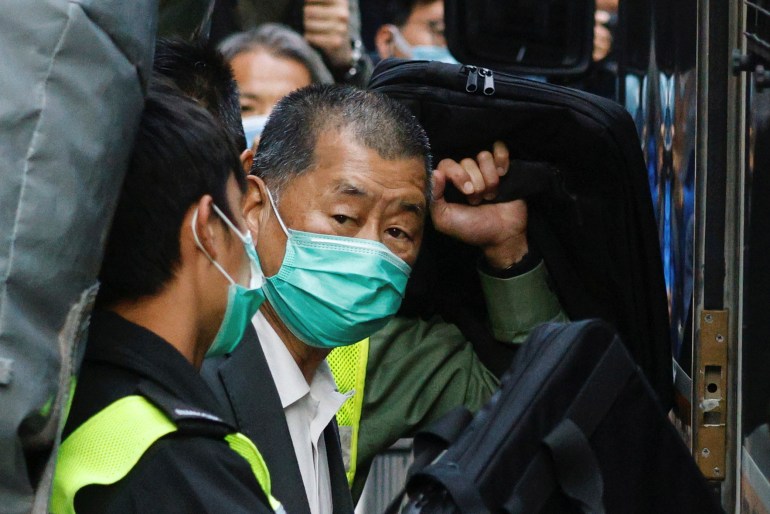For Hong Kong’s arrested pro-democracy activists, justice must wait
Closing arguments are due to begin in high-profile trial of 16 pro-democracy figures nearly three years after arrests.

Taipei, Taiwan – Closing arguments are due to begin in Hong Kong on Wednesday in the high-profile trial of 16 pro-democracy activists and legislators, more than 1,000 days after they were arrested by national security police.
Ten days have been set aside for prosecutors and defence lawyers to summarise their arguments in the case against the 16, who are among 47 pro-democracy figures arrested on charges of conspiracy to commit subversion in pre-dawn raids in January 2021.
Keep reading
list of 4 itemsHamas releases 11 more captives from Gaza, Israeli army says
Twenty killed in Sierra Leone attack on military barracks, army says
US rights advocates launch hunger strike for Israel-Hamas ceasefire
If convicted, they face a maximum sentence of life imprisonment.
The high-profile case has been marked by repeated delays, drawing international criticism, with most of the defendants remanded in custody for nearly three years after being denied bail.
The trial, which was predicted to last 90 days, has dragged on for nearly 10 months as three national security judges – handpicked by the government – wade through thousands of pages of evidence provided by the defence and prosecution.
Hong Kong prosecutors allege that the 47 violated the city’s sweeping national security legislation by organising an unofficial election primary in July 2020 as part of a plot to gain a majority in the semi-democratic legislature and veto the government’s budget bills.
Among the group, 31, including prominent activist Joshua Wong, former legislator Claudia Mo, and legal scholar Benny Tai, have pleaded guilty and are awaiting sentencing.
“Delayed justice is injustice and repeated delays or postponement of trials particularly in [national security] cases reflects that the prosecution has not done a good job in managing these cases,” Eric Lai, a research fellow at Georgetown Center for Asian Law, told Al Jazeera.

While the “Hong Kong 47” case is the largest national security case to date, drawn-out proceedings have become a feature of the city’s British-inherited legal system since the imposition of the national security law following anti-government protests in 2019.
Although Hong Kong retained its common law legal system after the city’s return to China in 1997, the national security law weakened or scrapped many common law norms, including the presumption in favour of bail and the right to a jury trial.
The number of people in Hong Kong prisons on remand – those in detention while awaiting trial or sentencing – jumped from 2,044 to 3,304 people between December 2018 and September 2023, according to data collected by the Hong Kong Correctional Services Department.
As a percentage of cases, the share of those in remand grew from 24.98 percent to 37.24 percent over the period.
Much of the backlog stems from some 3,000 prosecutions that followed the 2019 protests, when more than 10,000 people were arrested and charged for offences such as unlawful assembly, possession of an offensive weapon, criminal damage and assaulting a police officer, according to data compiled by the Georgetown Center for Asian Law.
Prosecutions of protest-related cases have typically taken 30 percent longer than other criminal cases, according to an analysis by the Georgetown Centre, with 41.8 percent taking more than a year to complete as of August 2022 – eating up court time and resources.
“The number and proportion of people in [Hong Kong] jails who have not been convicted are both at record highs. There is a known shortage of judges in [Hong Kong] courts, which along with thousands of protest-related cases may have caused backlogs in trials,” David Webb, a former investment banker who maintains a 23-year database on the number of people in custody, told Al Jazeera.
“There is also a tendency to deny bail pending trial in protest-related cases, stemming from a presumption against bail in the National Security Law which has also been applied to non-NSL cases.”
Hong Kong’s courts are facing a growing shortage of judges, with nearly one in four judicial posts currently vacant amid complaints of low pay and a broader brain drain since the COVID-19 pandemic.
Victor Dawes, the chairman of the Hong Kong Bar Association, earlier this year warned that proposals by some US lawmakers to sanction judges that hear national security cases could make it even more difficult to recruit talent.
Hong Kong Chief Executive John Lee has hinted that “significant national security trials” could one day move to Beijing if sanctions affect court proceedings.
As of August, 264 people have been arrested by national security police and 148 charged under the national security law or the colonial-era offence of sedition, according to research by Lai and others published by ChinaFile.
Of these, 103 have been convicted and 45 are still on trial. None has been acquitted.

Other high-profile delays include the case of Jimmy Lai, the founder of the shuttered pro-democracy newspaper Apple Daily, whose national security trial is due to begin on December 18, a year after it was first scheduled.
Lai, 75, has been detained since December 2020, first in pre-trial detention and then under a five-year sentence for fraud. He could spend the rest of his life in prison if found guilty of national security offences.
The trial of Chung Pui-luen and Patrick Lam, two editors of the now-defunct digital news outlet Stand News, has also faced delays since it began in October 2022.
During the trial, defence lawyers accused the prosecution of improperly submitting some 1,500 pages of undeclared evidence, causing further delays.
The Stand News verdict is not expected until next year as the court considers the impact of a UK Privy Council ruling over a separate sedition case in Trinidad and Tobago, another common law jurisdiction, which found sedition must include “an intention to incite violence or disorder.”
Unlike other delays, the deferral in that case may be a rare glimmer of good news, according to Georgetown’s Lai, as it “shows that the local courts are still eager to respect the whole common law system”.
“It will be a long process but at the same time it also shows the court has to consider the latest development on how the common law courts worldwide consider the offence of sedition,” Lai said.